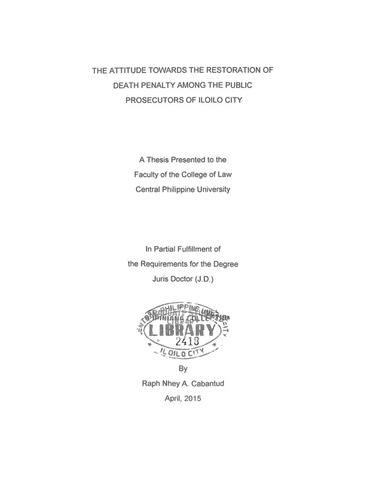Показать сокращенную информацию
The attitude towards the restoration of death penalty among the public prosecutors of Iloilo City
| dc.contributor.adviser | Alibogha, Salex E. | |
| dc.contributor.author | Cabantud, Raph Nhey A. | |
| dc.date.accessioned | 2021-02-04T05:58:26Z | |
| dc.date.available | 2021-02-04T05:58:26Z | |
| dc.date.issued | 2015 | |
| dc.identifier.citation | Cabantud, R. N. A. (2015). The attitude towards the restoration of death penalty among the public prosecutors of Iloilo City (Unpublished postgraduate thesis). Central Philippine University, Jaro, Iloilo City. | en_US |
| dc.identifier.uri | https://hdl.handle.net/20.500.12852/163 | |
| dc.description | Abstract only | en_US |
| dc.description.abstract | This study focused on the attitude of the Public Prosecutors of Iloilo City towards the restoration of the death penalty as punishment for heinous crimes, likewise, whether or not a penalty by means of lethal injection constitutes cruel, inhuman, and degrading punishment, and the underlying reasons thereof. The research called for the application of Formalism and Utilitarianism Theories. The study gave importance to the determination of the population of prosecutors who are in favor or not to the restoration of the death penalty, the reasons for the agreement or disagreement of said restoration, the population of prosecutors who believed that the death penalty through lethal injection cruel, degrading or inhuman, or otherwise, and the reasons for such attitude. The researcher used the non-experimental method particularly the descriptive-qualitative design. Through a survey by the use of a questionnaire, pertinent and needed answers were solicited from the respondents. The sampling technique used was accidental sampling. The researcher chose, based X on the respondents’ availability on the time and at the place of the survey, 13 public prosecutors in the Office of the City Prosecution, Iloilo City. For data collection and processing, the researcher used the frequency percentage method. Based on the answers solicited from the respondents through the questionnaire, the majority or 53.85% of all the public prosecutors in the City of Iloilo who participated in the survey agreed to restore the death penalty as punishment for heinous crimes. The top reasons for such a view are: (1) It poses as deterrence in the commission of the crime; (2) It is a just and rightful punishment, and (3) It is biblical. Whereas those who answered in the negative, their opposition are based on the following reasons: (1) It is not a deterrence in the commission of the crime; (2) It is against Christian values; (3) It is unnatural and; (4) it is to give the offender a chance. On the other hand, a majority or 84.62 of the same respondents believed that the death penalty by means of lethal injection is not cruel, inhuman, or degrading punishment. The top reasons provided by the respondents are: (1) It is subtle, painless, and quick; (2) It is better than any other means of execution; and (3) the law provides that it is not cruel, degrading, or inhuman punishment. Whereas those respondents who answered otherwise, their opposition is based on the reason that, all forms of death practice are cruel, inhuman, or degrading. | en_US |
| dc.format.extent | ii, 42 leaves | en_US |
| dc.language.iso | en | en_US |
| dc.subject.ddc | GSL Theses 340.72 C111 | en_US |
| dc.subject.lcsh | Capital punishment | en_US |
| dc.subject.lcsh | Public Prosecutors--Attitude | en_US |
| dc.subject.lcsh | Punishment | en_US |
| dc.subject.lcsh | Lethal injection (Execution) | en_US |
| dc.title | The attitude towards the restoration of death penalty among the public prosecutors of Iloilo City | en_US |
| dc.type | Thesis | en_US |
| dc.description.bibliographicalreferences | Includes bibliographical references | en_US |
| dc.contributor.department | College of Law | en_US |
| dc.description.degree | Juris Doctor | en_US |
| local.subject | Capital punishment--restoration | en_US |
| local.subject | Restore death penalty | en_US |
Файлы в этом документе
Данный элемент включен в следующие коллекции
-
Juris Doctor [144]


